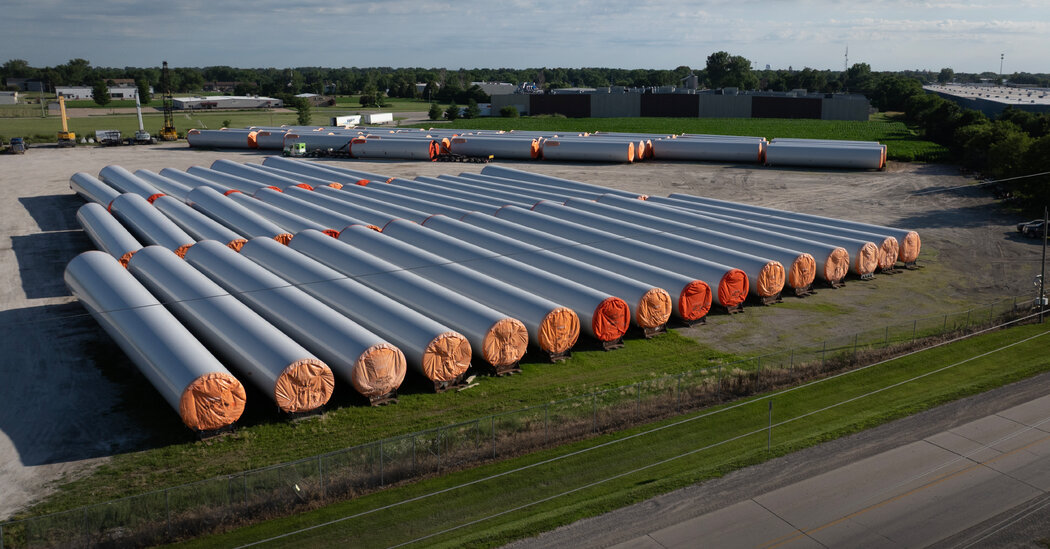
The Trump administration said on Thursday that it would apply new layers of political review to wind and solar projects, potentially creating hurdles for renewable energy developments across the country.
The Interior Department said in a memo that a wide range of agency actions related to approving new wind and solar power plants would now have to be reviewed by the office of Interior Secretary Doug Burgum, instead of by lower-level agency staff.
That includes more than 68 types of agency actions, including federal permits, environmental reviews, lease sales, site plans, wildlife impact assessments and numerous smaller decisions and consultations.
In a statement, the agency said that the move was aimed at “ending preferential treatment for unreliable, subsidy-dependent wind and solar energy.”
The broad nature of the memo could create bottlenecks and delays for a significant number of renewable energy projects, experts said.
While only a relatively small fraction of wind and solar projects is built on federal lands and waters managed by the Interior Department, many projects on private lands often consult with the agency to determine whether they need federal permits to comply with wildlife protections or other laws.
Industry groups said the move threatened to hinder the construction of wind power and solar power, which have recently been among the fastest-growing sources of electricity in the United States.
The directive would add “new layers of needless process and unprecedented political review to the construction of domestic energy projects,” said Jason Grumet, chief executive of the American Clean Power Association, which represents renewable energy producers.
“The secretary of the interior will apparently now be personally reviewing thousands of documents and permit applications for everything from the location and types of fences to the grading of access roads on construction sites across the country,” Mr. Grumet added. “This isn’t oversight. It’s obstruction that will needlessly harm the fastest-growing sources of electric power.”
Despite declaring that the nation faces an energy emergency to meet growing demand for electricity, Mr. Trump has frequently criticized wind power and solar power, and his administration has for months sought to blunt their growth.
The giant Republican policy bill, which Mr. Trump signed into law on July 4, will quickly phase out most Biden-era federal tax credits for wind and solar power over the next two years.
During debate over that legislation, some conservative House Republicans had argued for an even faster end to the subsidies. They eventually voted for the bill, but only after saying that Mr. Trump had promised to address their concerns through executive action.
Then, last week, the president issued an executive order that could make it more difficult for wind and solar projects to receive the remaining tax credits. The order directed the Treasury Department to consider revising its guidelines for how and when renewable energy projects would need to begin construction in order to qualify for tax breaks. It also directed the Interior Department to review its policies in order to “determine whether any provide preferential treatment to wind and solar facilities.”
The Interior Department did not provide details on what its new reviews would entail. Among other things, the law signed by Mr. Trump will raise fees imposed by the agency for wind and solar projects on federal lands while reducing the royalties that coal, oil and gas companies pay to mine and drill on federal lands. It also provides additional tax breaks to oil and gas producers for “intangible drilling and development costs.”
“Today’s actions further deliver on President Trump’s promise to tackle the Green New Scam and protect the American taxpayers’ dollars,” said Adam Suess, the acting assistant secretary for lands and minerals management at the Interior Department. “American energy dominance is driven by U.S.-based production of reliable base load energy, not regulatory favoritism toward unreliable energy projects that are solely dependent on taxpayer subsidies and foreign-sourced equipment.”
Renewable energy proponents said that many of the Trump administration’s actions — such as its moratorium on new offshore wind power projects — go well beyond the removal of subsidies. Some have argued that the Trump administration’s actions to thwart renewable energy projects are the inverse of steps taken by the Biden administration to try to block oil and gas drilling on public lands, and they have asked instead for an “all of the above” approach to federal energy permitting.
“At a time when energy demand is skyrocketing, adding more layers of bureaucracy and red tape for energy projects at the Interior Department is exactly the wrong approach,” said Stephanie Bosh, senior vice president of communications at the Solar Energy Industries Association, a trade group. “It is deeply unfortunate that this administration’s energy policy continues to favor specific technologies rather than advance true American energy dominance.”